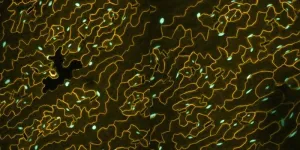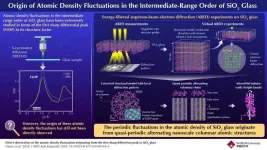(Press-News.org) Portland State will power up a new high-performance computing cluster that will give researchers at universities and colleges across Oregon the ability to advance computing-intensive research projects by processing large datasets and performing complex computations in a fraction of the time — thanks to a nearly $1 million grant from the National Science Foundation’s Campus Cyberinfrastructure program.
The Oregon Regional Computing Accelerator (Orca) aims to provide free-of-cost computing resources and cyberinfrastructure to colleges in the region, with a special emphasis on rural, regional and minority-serving institutions that otherwise wouldn’t have access to cost-prohibitive computing resources.
“Orca embodies our commitment to inclusive innovation by providing critical resources to both rural and minority-serving institutions, enhancing statewide research in vital areas like data science and cybersecurity,” said Rick Tankersley, vice president for Research and Graduate Studies. “This effort not only strengthens our academic partnerships but also equips us to lead in computational research and education.”
The project is designed to support research and educational projects at Heritage University on the Yakama Indian Reservation in Washington, Lewis & Clark College, Oregon State University, Portland Community College, Reed College, Southern Oregon University, University of Oregon, Western Oregon University and Willamette University.
Will Pazner, principal investigator and an assistant professor of applied and computational mathematics at PSU, said data and computational-enabled science are playing an increasingly important role across almost all domains of research and education and computationally intensive fields such as machine learning demand high-performance hardware — the cost of which is often out of reach for smaller institutions.
“We believe this cluster will be instrumental in advancing scientific research, improving computation-related educational opportunities, and enhancing workforce development,” said Pazner, who joined PSU in 2022 as part of a cluster hire in computational science for a sustainable future.
Orca is not PSU’s first high-performance computing (HPC) cluster. In 2016, PSU’s Portland Institute for Computational Science procured the Coeus HPC cluster with the support of an NSF instrumentation grant. Orca, building on PSU’s existing infrastructure, will feature both GPUs — short for graphics processing units, advanced chips used to perform mathematical calculations at high speed — and high-performance CPU cores, a central processing component of a computer.
Its design and specifications have been created through collaboration and consultation with researchers from across the region. Some of the research projects that will benefit with Orca’s acquisition include climate and atmospheric modeling, computational analysis of legal text, geohazard simulation, and graph algorithms for molecular systems biology. The cluster will be designed with user-friendly features such as a web-based interface to facilitate classroom usage, providing students with opportunities to build machine learning models, work with large datasets and experiment with advanced algorithms.
Orca will leverage the network of Link Oregon, a nonprofit consortium that provides high-speed, fiber-optic broadband connectivity to the state’s public and nonprofit sectors.
“High performance and high throughput computing (HPC/HTC) capabilities demand state-of-the-art networks that can cost effectively deliver fast, reliable and secure transport of extremely large datasets without degrading overall network performance,” said Steve Corbató, executive director of Link Oregon and a co-investigator for this project. “We are proud to support Portland State University's expanded HPC efforts and the Orca collaboration with high-speed network services that will enable their researchers to scale their compute and data-intensive initiatives.”
The cluster is expected to be installed and operational by 2025. The project’s co-investigators include Josef Dufek, professor and chair of earth sciences from the University of Oregon; Mark Keever, executive director of digital research infrastructure at Oregon State University; and Greg Anderson, an assistant professor of computer science at Reed College.
END
PSU secures $1 million grant for high-performance computing cluster across Oregon
2024-06-03
ELSE PRESS RELEASES FROM THIS DATE:
New $12.5 million National Science Foundation grant awarded to study phenomenon affecting agriculture, cancer, biodiversity and more
2024-06-03
It’s in your heart and liver, in the vegetables you eat, in the rogue cells that cause cancer. Those who live in temperate regions are surrounded by more of it than people who live in the tropics, and without it, humans wouldn’t exist.
It’s called polyploidy, and only within the last few years have biologists begun to recognize its significance across the tree of life.
“It’s one of the most important biological processes that hardly anybody knows about,” said Doug Soltis, a distinguished professor at the Florida Museum of Natural History.
Soltis is one of 18 scientists who have received a combined ...
SwRI-led team to bolster earthquake readiness for U.S. Federal Highway Administration
2024-06-03
SAN ANTONIO — June 3, 2024 — Southwest Research Institute will enhance models to strengthen the earthquake resilience of America’s transportation infrastructure and improve public safety in earthquake-prone areas. As part of a contract with the U.S. Federal Highway Administration (FHWA), an SwRI-led team will update and improve liquefaction models. Liquefaction occurs during an earthquake when intense shaking causes soil to temporarily act more like a fluid, losing its capacity to support roads and structures.
“For highways specifically, sometimes state and ...
Updating the way the Lab computes
2024-06-03
Unraveling the behavior of plasma increasingly requires intensive computing resources. That’s why plasma demands a calculated approach to computation.
As the new head of computational sciences at the U.S. Department of Energy’s (DOE) Princeton Plasma Physics Laboratory (PPPL), Shantenu Jha is excited to be at the helm of the Lab’s computing efforts, fusing computer science expertise with PPPL’s pioneering research into the fourth state of matter.
“I want to continue to grow the excellence that already exists in computing for fusion energy at PPPL, which ...
New study finds popular diabetes and weight-loss drugs associated with reduction in incidence and recurrence of alcohol-use disorder by at least half
2024-06-03
CLEVELAND—A new study by researchers at the Case Western Reserve University School of Medicine reveals that the popular diabetes and weight-loss drugs Wegovy and Ozempic are linked to reduced incidence and recurrence of alcohol abuse or dependence.
The team’s findings, recently published in the journal Nature Communications, may suggest a possible new treatment for excessive alcohol use—including alcohol-use disorder (AUD), a health condition that causes about 178,000 deaths in the United States each year, according to the Centers for Disease Control.
To date, the U.S. Food and Drug Administration (FDA) has approved only three medications to treat AUD.
The active ingredient ...
Protein discovery could help prevent cancer treatment-related heart damage
2024-06-03
Blocking a protein known as CDK7 could prevent heart damage associated with a commonly used cancer chemotherapy medication, according to a study led by scientists at Washington State University. Importantly, the researchers also found that inhibiting CDK7 could help enhance the medication’s cancer-killing capability.
Based on an animal model, the study findings could provide a foundation for future treatment strategies to reduce chemotherapy-related heart toxicity and increase treatment effectiveness. ...
Fewer than 1 in 4 patients receive dietary counseling after a heart attack
2024-06-03
Although diet is the leading contributor to premature death from heart disease in the United States, fewer than one-quarter of people who undergo major heart events receive dietary counseling in the aftermath, a study finds.
The research, led by a team from the University of Michigan Health Frankel Cardiovascular Center, tracked nearly 150,000 patients seen at hospitals across Michigan for serious heart conditions — such as heart attack and heart failure — between late 2015 and early 2020.
Results published in Journal of the Academy of Nutrition ...
Endocrine Society Guideline recommends healthy adults under the age of 75 take the recommended daily allowance of vitamin D
2024-06-03
BOSTON—Healthy adults under the age of 75 are unlikely to benefit from taking more than the daily intake of vitamin D recommended by the Institutes of Medicine (IOM) and do not require testing for vitamin D levels, according to a new Clinical Practice Guideline issued today by the Endocrine Society. For children, pregnant people, adults older than 75 years and adults with high-risk prediabetes, the guideline recommends vitamin D higher than the IOM recommended daily allowance.
Vitamin D use and ...
A dark side to dark chocolate? New study finds very minimal risk for kids from metals in chocolates
2024-06-03
Chocolate lovers may have been alarmed by a 2023 Consumer Reports finding that some dark chocolate brands could contain harmful levels of lead and cadmium.
However, a new study by Tulane University published in Food Research International has found that dark chocolate poses no adverse risk for adults and contains nutritionally beneficial levels of essential minerals.
The study sampled 155 dark and milk chocolates from various global brands sold in the United States and tested for the presence of 16 heavy metals ranging from the toxic (lead and cadmium) to the essential (copper, iron, zinc). The study then modeled the risk of eating one ounce of the chocolates per day which ...
ECOG-ACRIN completes first trial of Black patients with early-stage breast cancer
2024-06-03
Black patients with early-stage breast cancer who were treated with docetaxel chemotherapy every 3 weeks had less drug-induced peripheral neuropathy and significantly fewer dose reductions compared to those who received weekly paclitaxel, according to a trial by the ECOG-ACRIN Cancer Research Group (ECOG-ACRIN). Study EAZ171 is the first National Cancer Institute (NCI)-sponsored trial to focus specifically on enrolling a minority or underserved population to assess drug-induced toxicity (rather than drug efficacy) ...
Understanding the atomic density fluctuations in silica glass
2024-06-03
In materials science, particularly in the study of glasses, the intermediate range order (IRO) is one of the most intriguing research areas owing to its significant influence over the physical properties of glasses. The IRO refers to the structural arrangement of atoms beyond the short-range order (atomic arrangement within a few atomic distances) but shorter than the long-range order (arrangement patterns over macroscopic distances). Notably, for covalent glasses, the IRO is marked by atomic density fluctuations.
Scattering experiments provide a distinct signature of ...





